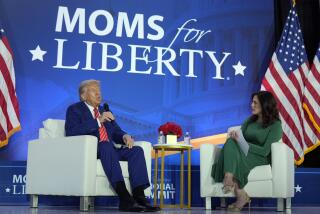World View : A Moscow Shift Toward the West : * The coup may speed the trend to global ties based less on ideology and more on geography.
Over the past four decades, those who spoke of East-West tensions in the world meant the bitter Cold War rivalry between Moscow and Washington. But both last week’s failed coup in the Soviet Union and a series of recent developments in Asia may presage a different set of East-West divisions in international politics--between a Japan-led Asia on the one hand and the United States and Western Europe, with Moscow as their new partner, on the other.
Since the end of World War II, ideology has been the touchstone of East-West divisions. But if present political trends continue, over the next decade or so those divisions may be based more upon geography and culture.
What are these trends? First, the Soviet Union--or its Russian replacement--appears likely to identify increasingly with Western Europe and the United States. Meanwhile, on a surprising number of issues, Asian countries have recently begun to band more closely together--often in opposition to Western Europe and the United States.
The result could be a changed world in which regions and historical traditions matter much more in determining a nation’s foreign policy than they have in the past 40 years, and in which economic systems matter much less.
The principal dividing issues are democracy and human rights, and the extent to which these political goals are linked inextricably to economic advancement. “The verdict is still out in Asia,” observes James Clad of the Carnegie Endowment for International Peace. “Authoritarian traditions have existed quite nicely along with economic success.”
For now, these trends toward geographic divisions seem to be gradual. And there are forces in the reverse direction. For example, the economic and security links between the United States and Japan may prompt both countries to resist any breakdown of the world into regional or geographic groupings. Similarly, continent-straddling Russia has important economic links to Asia.
Still, last week’s failed coup is seen by many analysts as having accelerated an already pronounced trend toward Moscow’s identification with Europe and the West.
Symbolically, at his first press conference after his release, Soviet President Mikhail S. Gorbachev went out of his way to pay respects to the foreign leaders who had telephoned and supported him: President Bush, French President Francois Mitterrand, German Chancellor Helmut Kohl and British Prime Minister John Major, in that order. (Japan, the world’s second-leading economic power, was also mentioned, but only later--after Canada and Australia.)
Gorbachev also specially thanked the British Broadcasting Corp. and the United States’ Radio Liberty and Voice of America for keeping him informed while he was being detained. It was an astonishing admission of his reliance on the British and American broadcasting services, which have long sought to disseminate Western political ideals.
The record suggests that the Russian Federation’s newly empowered president, Boris N. Yeltsin, may in some ways be an even greater champion of a European orientation than is Gorbachev.
“Russia should return to Europe, where it has been for 1,000 years,” Yeltsin declared last year, on the day after his election as president of the Russian republic. He was careful to add that Russia “should be a bridge between Europe and Asia”--but even these words seem to suggest that Yeltsin does not consider Russia to be part of Asia.
Whereas Gorbachev’s foreign policy has included efforts at reconciliation with both China and Japan, Yeltsin and his Russian Federation have showed signs of resistance to the Soviets’ new Asia policies.
Last year, as Gorbachev began to explore the possibility of returning to Japan some of the Kuril Island chain (which Soviet troops occupied after World War II), Yeltsin voiced opposition, invoking Russian nationalism. “It is inconceivable that we would sell the Kurils, for whatever sum, like we once did Alaska,” he said in a French television interview. “The Russian people wouldn’t stand for it.”
Now, in the days since the Soviet coup failed, U.S. officials and analysts say Japan seems to be the strongest opponent among the world’s major industrialized nations of new economic aid to Moscow. (The Bush Administration has also expressed some resistance to suggestions that it boost aid, insisting that until Moscow adopts clear economic reforms, it would be premature to offer added help.)
At the same time, European leaders such as Kohl have pressed for a new international effort to provide financial help to the Soviet Union.
As for China, from the time of his inaugural speech as Communist Party leader in 1985, Gorbachev made improving ties with Beijing one of the top priorities in his foreign policy. Despite their ideological differences, Gorbachev re-established the ties broken three decades ago between the Soviet and Chinese Communist parties.
By contrast, last year, officials of Yeltsin’s Russian Federation opened the way for unprecedented exchanges between the republic and China’s longtime nemesis, Taiwan. Moscow’s elected non-Communist mayor, Gavriil Popov, one of the leaders of the resistance to last week’s coup, two years ago paid a visit to the Taiwanese capital, Taipei.
While the Soviet Union is beginning to forge new political and emotional links with the West, East Asian nations led by Japan have been displaying an unprecedented sense of identification with one another--one that surpasses the ideological differences within Asia.
This has been especially true on questions of human rights and democracy in Asia. Newly assertive Asian leaders argue that their American and European counterparts are too outspoken in their condemnations of non-democratic countries and too hasty in favoring the imposition of economic sanctions against these countries.
For the last two years, Japan has taken the role of spokesman for Asia at meetings of the world’s leading industrialized nations. In that role, Japan pressed hard at the Houston economic summit last year for a resumption of international lending to China, which had been subject to economic sanctions since its 1989 crackdown on democracy demonstrations in Beijing.
This summer, Japanese Prime Minister Toshiki Kaifu became the first leader of any major industrialized nation to visit China, in effect breaking an embargo on top-level political contacts with Beijing.
In July, at a conference of the Assn. of Southeast Asian Nations (ASEAN) in Malaysia, Asian governments joined in rejecting an initiative by the United States and the European Community to take tough action against Myanmar (formerly Burma) for its violations of human rights.
“We cannot change them by putting pressure on them,” Thailand’s Foreign Minister Arsa Sarasin said of Myanmar’s military leaders. “ . . . We believe that isolating Burma would not bring about the positive change we all hope for.” Some Asian officials argued that there is a fundamentally different and unique Asian perspective on questions of human rights.
Japan threw its support behind these other Asian governments, condemning the American and European approach. “Pure pressure sometimes invites a negative response from some kinds of countries,” Japanese spokesman Makoto Yamanaka told one Western reporter. “That may not satisfy you, but perhaps our Asian friends here understand.”
Similarly, there were hints at the ASEAN conference that these political differences may crop up once again over efforts to bring about a peace settlement in Cambodia.
Secretary of State James A. Baker III pressed hard for a comprehensive settlement that would include democratic elections. But the Southeast Asian nations omitted any mention of elections or a comprehensive settlement, suggesting that they might accept a government of “national reconciliation” in which two rival Communist factions--the insurgent Khmer Rouge and the Vietnam-backed regime in Phnom Penh--would share power.
These trends within Asia have begun to extend beyond politics to economics and to military affairs. Japan took its first tentative step at the ASEAN meeting in support of region-wide talks or a conference on questions of Asian security--an idea long opposed by the United States.
To the annoyance of U.S. officials, Malaysian Prime Minister Mahathir Mohammed last year proposed formation of a new intra-Asia trade group--one that would include Japan, but not the United States, Australia, Canada or the Soviet Union. That idea has not yet won acceptance, but last month Southeast Asian governments decided on their own to move further toward regional economic cooperation.
But there are factors at work that may act to counter any widening of divisions between Asia on the one hand and the United States and Western Europe on the other.
The most important is the strong and continuing economic interdependence and security alliance between Japan and the United States. And as the decade unfolds, other East Asian nations will probably be less happy than they seem to be at the moment to have Japan act as chief spokesman and dominant power in the region.
The Soviet Union, with the bulk of its landmass and vast natural resources between the Urals and the Pacific, also has strong national interests in Asia as well as Europe. While Yeltsin has been critical of any deal that would hand back what he considers Russian territory in the Kurils to Japan, he has also supported efforts by Gorbachev to attract help and investment from South Korea for projects such as the development of Siberia.
No one can say how these various and competing forces will work themselves out. It seems clear, however, that the revolution in Moscow last week not only shook the world, but opened the way for new definitions of East and West.
More to Read
Sign up for Essential California
The most important California stories and recommendations in your inbox every morning.
You may occasionally receive promotional content from the Los Angeles Times.






